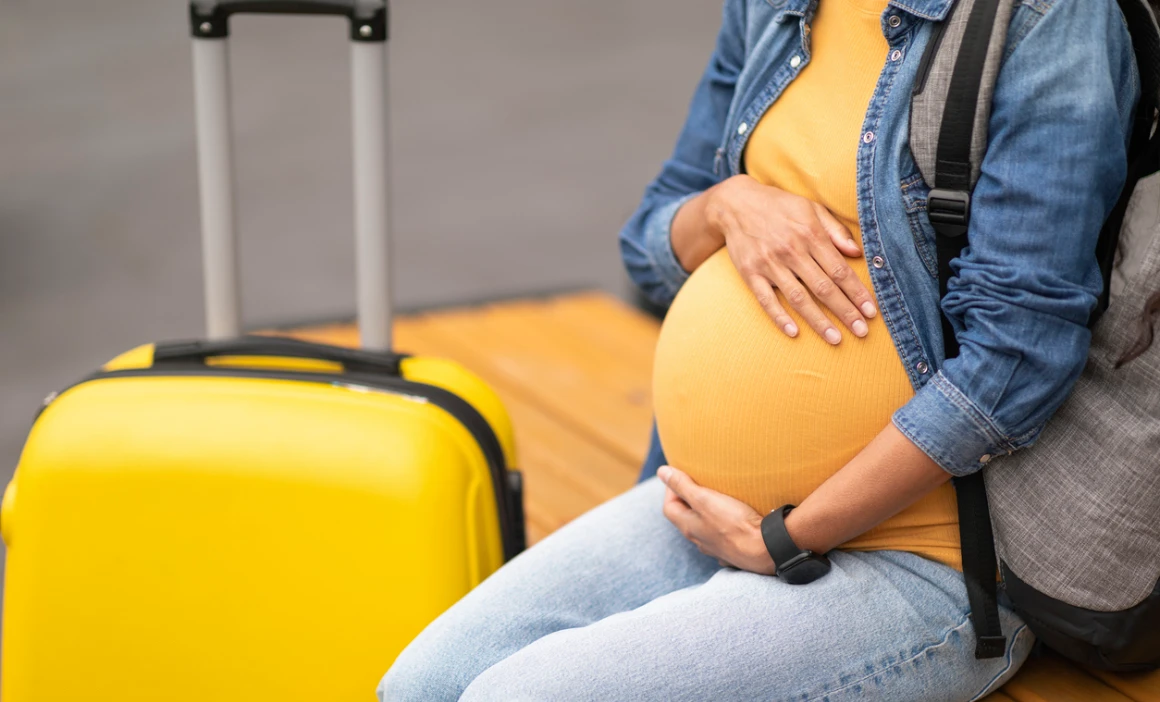
Traveling While Pregnant: A Comprehensive Guide to Safety, Comfort, and Preparation

Cradle of Nutrition
- 4 minutes read
By Erika Barabás
Traveling while pregnant can feel daunting, but with the right precautions, it can be a safe and enjoyable experience. Whether you’re taking a road trip, hopping on a flight, or traveling internationally, proper planning is crucial for your well-being and that of your baby. In this guide, we’ll walk you through everything you need to know about traveling during pregnancy, including the best times to travel, essential packing tips, and safety advice to ensure a smooth journey.
When to Travel During Pregnancy: Consulting Your Healthcare Provider
Before booking any trip, the most important step is consulting your healthcare provider. Pregnancy can be unpredictable, and your doctor or midwife will provide personalized guidance based on your health, gestational age, and any potential complications. Travel is generally safe during pregnancy, but there are exceptions. For high-risk pregnancies or specific health concerns like gestational diabetes or preeclampsia, some forms of travel—especially long-haul flights or international trips—may not be advisable.
Pregnancy Travel Tips: Best Trimesters for Traveling
The second trimester is typically the best time to travel during pregnancy. By this stage, morning sickness has usually passed, and the risks of early pregnancy complications are lower. In contrast, the third trimester presents increased physical discomfort and a higher risk of preterm labor, especially if you’re traveling far from home. To ensure a safe and enjoyable trip, aim to travel during your second trimester whenever possible.
If you must travel in the third trimester, take extra precautions. For example, long flights and road trips might not be ideal. Always consult with your healthcare provider to discuss travel safety and any necessary precautions.
Flying While Pregnant: Key Considerations and Tips for Air Travel
Air travel is often considered safe for pregnant women, particularly during the second trimester. However, there are several important tips to keep in mind:
- Airline Policies for Pregnant Travelers: Different airlines have varying policies regarding pregnancy. Many airlines allow travel until the 36th week for uncomplicated pregnancies, but some require a doctor’s note after 28 weeks. Always check your airline’s pregnancy policies in advance.
- Preventing Swelling and Discomfort: Prolonged sitting during flights can lead to swelling and discomfort. Wear compression socks to reduce the risk of deep vein thrombosis (DVT), and make sure to stretch or walk around every couple of hours.
- Seat Selection and Comfort: Choose a seat with extra legroom if possible. Many airlines also offer priority boarding for pregnant travelers, so don’t hesitate to ask for assistance.
Road Trips and Travel by Car: Tips for Comfort and Safety
Road trips can be a convenient way to travel while pregnant, but it’s essential to keep a few things in mind:
- Comfort and Safety: Always wear your seatbelt correctly—position the lap belt below your belly, and the shoulder strap across your chest. For long drives, take frequent breaks every 2 hours to stretch, hydrate, and rest.
- Duration and Proximity to Medical Help: Avoid extended, isolated trips, especially in the later stages of pregnancy. Familiarize yourself with nearby hospitals or medical centers along your route.
What to Pack for Traveling While Pregnant: Essential Items
Packing smartly can make all the difference in ensuring a comfortable journey. Here’s a checklist of essential items to bring:
- Medical Essentials: Don’t forget your prenatal vitamins, prescribed medications, and any required documentation from your healthcare provider. If you’re traveling internationally, check your travel insurance to ensure maternity-related coverage.
- Hydration and Comfort: Pack a reusable water bottle, healthy snacks (nuts, fruit, crackers), a neck pillow for comfort, and loose, breathable clothing. Compression socks are essential, especially for long flights or car rides.
- Important Documents: Have your passport (for international trips), travel insurance information, and emergency contacts on hand. A medical emergency card detailing your pregnancy can also be helpful, especially when traveling abroad.
Seeking Help While Traveling: Resources for Pregnant Travelers
If you need assistance during your travels, there are several resources you can turn to:
- Airline Staff: Always inform the airline staff about your pregnancy. They can offer assistance with seating arrangements, priority boarding, and overall comfort.
- Local Medical Providers: When traveling abroad, familiarize yourself with nearby hospitals or clinics. Your embassy can also provide a list of trusted healthcare providers in the area.
- Travel Insurance Providers: Ensure your travel insurance covers pregnancy-related issues. In case of an emergency, your insurer can help direct you to appropriate medical facilities.
- Embassies or Consulates: If you encounter any issues while abroad, your embassy or consulate can provide emergency support, including medical referrals.
With the right preparation, traveling while pregnant can be a safe and enjoyable experience. Whether you’re planning a quick road trip or a long-haul flight, make sure to consult your healthcare provider, stay hydrated, and pack wisely. Don’t forget to know where to turn for help if necessary. Above all, listen to your body, and trust your instincts when it comes to traveling during pregnancy.
References:
- American College of Obstetricians and Gynecologists (ACOG). Travel during pregnancy, 2023
- World Health Organization (WHO). Pregnancy and travel health, 2020






